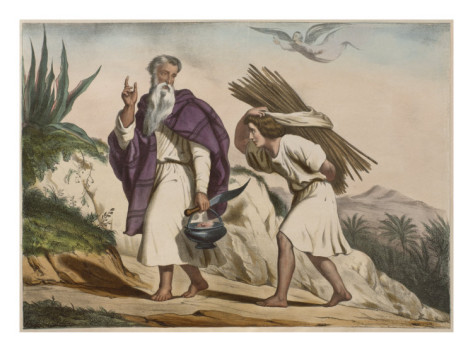
One of our favorite quotes comes from Thornton Wilder, the great novelist and playwright, who voiced a vision for the rehabilitation of Christianity in the midst of the Great Depression:
The revival in religion will be a rhetorical problem — new persuasive words for defaced or degraded ones.
This principle, in my view, still holds true, and it’s motivated a good deal of what we try to do at Mockingbird. Recently, Francis Spufford and Christian Wiman have been heroes in revivifying the language of faith, in respective terms of emotional intelligibility and a “new poetics of faith.” To those authors we could add a third, Sally Llody-Jones and her remarkable book The Jesus Storybook Bible, which cuts through much of the dross built on biblical stories by our overexposure to them – the multiplicity of interpretations, or what Walker Percy called “ravening particles” or the “preformed complex of expectations”, that which prevents us from seeing a thing as it is because we expect too much from it, are under a law of Experiencing It, and we often rush into philosophical questions or theological glosses when encountering a biblical text.
Not so with the JSB. Lloyd-Jones forces us to see the story as a story, and she lends credence to Christ’s claim that you must “become as a little child”, if that claim needed credence in the first place. In other words, she enters into the primal wonder of the biblical stories, forcing us out of our shells as theologians or self-conscious hermeneuts; we no longer look down on the story, like an accountant feverishly trying to balance the theological books, but up on the story; in wonder, in astonishment and admiration. Stripping us of our grown-up pretenses, Sally brings Barth’s “Strange New World” to life.
Her method wouldn’t work for everything, of course. A children’s guide to Romans would be weird; but on stories we probably err on the side of reading too textually, looking too much to fit the pieces together or looking for a meaning-behind-the-meaning rather than letting the images im-press themselves. All that to say, she had me (and well over half the room) in tears at last April’s Mockingbird NYC conference, and we couldn’t be more excited to have her back in 2014. Between then and now, we’ll just have to make do with her wonderful books. One of my favorite entries of hers comes from the Mount Moriah story (Genesis 22):
God knew that his Secret Rescue Plan could only work if Abraham trusted him completely. God had to make sure Abraham would do whatever he asked. So, a few years later, God asked Abraham to give him a present.
Abraham liked giving presents to God. He gave God his animals. They were called ‘sacrifices’ and they were a way to say ‘I love you’ to God.
But this time God didn’t want a lamb or a goat, God wanted Abraham to give him something more – much more. He wanted Abraham to give him his son, his only son, the son he loved – Isaac.
Put his boy on the altar and kill him as the sacrifice? How could God want him to do such a terrible thing?
In setting the stage, she doesn’t gloss over any of the gruesomeness, what Kierkegaard might call the ethical absurdity, of the story. It’s offensive and grotesque, and properly so. And it has the ability to shock even ‘us adults’, who perhaps have grown so used to Abraham’s redoubtable faith that we miss the story’s initial horror. But in my view, it gets even better: she makes a pretty original interpretive contribution, drawing out (or “leading out”) a literary dimension present, but only implicitly, in the original story:
Abraham didn’t understand. But he knew that God was his father who loved him. And so Abraham trusted him.
Early the next morning, Abraham and Isaac set off. They climbed the steep, stony trail up the mountain. Isaac carried the wood on his back. His father carried the knife and the coals…
Abraham asked his son to climb on top of the wood. Isaac didn’t understand but he knew his father loved him…
[After the ram was sacrificed,] God helped Abraham and Isaac understand something . God wanted his people to live, not die. God wanted to rescue his people, not punish them. But they must trust him.
Sally Lloyd-Jones brilliantly draws out the story’s parallel between Abraham’s fatherhood and God’s. Each carries the instrument of his destruction on his back – Isaac, the wood that will burn him; Abraham, the knife and coals which will make him guilty of filicide. Abraham makes Isaac do something he doesn’t understand, but he must trust his father; Abraham must trust God. As Abraham is about to kill his son, God is about to make Abraham (his son) guilty of murder. In both cases, their trust is built on a knowledge of God’s love.
And while the parallel of God’s and Abraham’s respective fatherhoods is only one potential aspect of interpretation in the original story, Sally Lloyd-Jones chooses this one specifically because it naturally means the most to kids, and in addressing children with this exploration of God’s identity as a loving father, she accesses our own inner children, even as adults. Through Abraham’s tears, we see the tears of a heavenly father sorrowful over his children’s destruction. And so it’s no longer an artificial leap to bring Jesus into it; God will incur both the planned victimhood (death) of Isaac and the planned guilt (murder) of Abraham. The story’s link to Jesus here is entirely natural and organic; effortless, even:
God was getting ready to give the whole world a wonderful present. It would be God’s way to tell his people, ‘I love you.’
Many years later, another Son would climb another hill, carrying wood on his back. Like Isaac, he would trust his Father and do what his Father asked. He wouldn’t struggle or run away.
Who was he? God’s Son, his only Son – the Son he loved. The Lamb of God.

COMMENTS
4 responses to “New Persuasive Words: Sally Lloyd-Jones and The Jesus Storybook Bible”
Leave a Reply
















Wonderful. Sure wish you could record her presentations…
Besides the actual Bible….Best. Book. In. Print. Period.